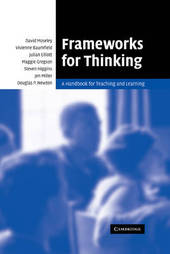
|
Frameworks for Thinking: A Handbook for Teaching and Learning
Hardback
Main Details
| Title |
Frameworks for Thinking: A Handbook for Teaching and Learning
|
| Authors and Contributors |
By (author) David Moseley
|
|
By (author) Vivienne Baumfield
|
|
By (author) Julian Elliott
|
|
By (author) Steven Higgins
|
|
By (author) Jen Miller
|
| Physical Properties |
| Format:Hardback | | Pages:380 | | Dimensions(mm): Height 229,Width 152 |
|
| ISBN/Barcode |
9780521848312
|
| Classifications | Dewey:370.1523 |
|---|
| Audience | | Professional & Vocational | | Tertiary Education (US: College) | |
|---|
| Illustrations |
29 Tables, unspecified
|
|
Publishing Details |
| Publisher |
Cambridge University Press
|
| Imprint |
Cambridge University Press
|
| Publication Date |
1 December 2005 |
| Publication Country |
United Kingdom
|
Description
This handbook focuses on the thinking processes necessary for learning. It provides descriptions and evaluations of 42 major frameworks including Bloom's taxonomy, de Bono's lateral and parallel thinking tools, Gardner's theory of multiple intelligences and Paul's model of critical thinking. Unique in its comprehensive coverage and interdisciplinary approach, it offers easy-to-grasp summary tables for each major theorist for speedy reference. The discussion of cognitive, emotional and social aspects of thinking and the nature of classification help the reader locate theories within a broader field of knowledge. Key concepts such as critical thinking, self-regulation and metacognition are examined from a range of perspectives. The handbook offers practical advice in the form of choices and recommendations for the use of frameworks in teaching, learning and assessment. A valuable tool for students needing to understand different ways of thinking it will also be an essential resource for teachers, curriculum developers, researchers and policy-makers.
Reviews'... concludes with a recommendation of three complementary frameworks which provide comprehensive coverage and will provide much food for thought for all those interested in extending their knowledge and application of thinking skills approaches.' Learning & Teaching
|